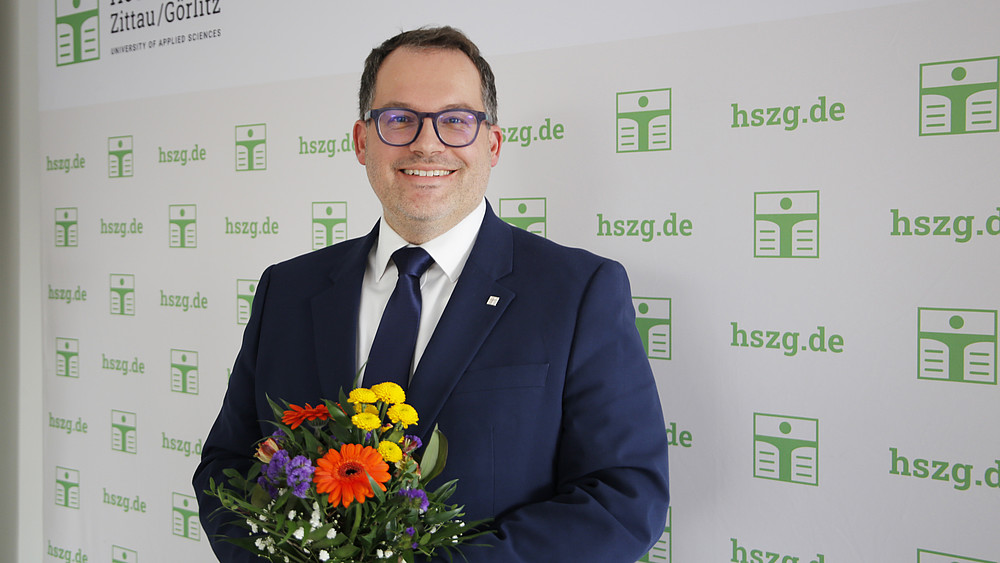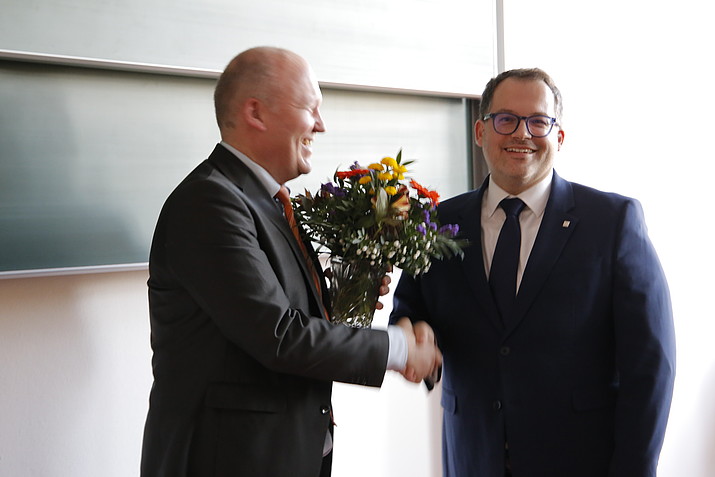Alexander Kratzsch was re-elected Rector of Zittau/Görlitz University of Applied Sciences by the Extended Senate on November 8.

Prof. Dr.-Ing. Alexander Kratzsch was re-elected Rector by the Extended Senate of Zittau/Görlitz University of Applied Sciences on November 8, 2024. The election was based on the selection committee's nomination. The selection committee was chaired by the Chairman of the University Council, Prof. Dr.-Ing. Alexander Kratzsch will steer the fortunes of the HSZG for a further five years from March 1, 2025 until February 28, 2030.
In his second term of office, with the help of already established initiatives and new projects, he would like to further advance the development process of the HSZG as a "university of the future", which is geared towards modern education and research and relies on regional and global partnerships.

When Prof. Kratzsch took over the position of Rector on March 1, 2020, he faced unprecedented challenges such as managing the consequences of the coronavirus pandemic and the associated introduction of hybrid teaching at the HSZG. Much of the experience gained during this time will be incorporated into the university's digitalization plans in the future.
Under his leadership, the Rectorate has been developing the "University for Future Process" (U4F). This is a participatory project that involves the entire university and its regional environment in planning for the future. The process was initiated to strengthen and innovatively position the university to meet the requirements of structural change in Upper Lusatia. The focal points include the design of a future-oriented campus, digital transformation and concepts for lifelong learning. Students, lecturers and regional stakeholders work in workshops and projects to develop new ideas and measures that are directly incorporated into the university's strategic direction.
To bundle the results achieved in the U4F process, Prof. Kratzsch acted as Chair of the Senate's "University Development 2030+" Strategy Commission from June 2022 to June 2023, which resulted in a strategy paper that formulates a long-term vision and strategic priorities to prepare the university for the challenges of the coming years. It emphasizes sustainable further development in various key areas, including digital transformation, internationalization, research excellence and the expansion of transfer opportunities. These initiatives are intended to help strengthen the university as an attractive location for education and research, particularly in the areas of energy management, resource management and social engagement. Parallel to Saxony's general university development planning, the strategy paper integrates climate protection targets and sustainability measures in order to become climate-neutral in the long term.
Since June 2023, Prof. Kratzsch has been a member of the board of the science network Hi!Lusatia e. V. since June 2023. The science network was founded as a regional association and aims to promote the scientific, economic and social development of the three-country region of Germany, Poland and the Czech Republic.
In addition, Prof. Kratzsch has been Deputy Chairman of the Board and Spokesperson for the Saxon Universities of Applied Sciences of the Saxon Rectors' Conference since December 2023 and also acts as the state spokesperson for the Saxon Universities of Applied Sciences at the German Rectors' Conference, where he advocates for the interests of the Saxon universities.
As a result of the U4F process, the HSZG, under his leadership, is pursuing the central goal of promoting STEM education in the region through extracurricular activities, e.g. through mobile learning locations and student academies. To this end, the Prorectorate for Education and International Affairs was in charge of the Future Learning Location Upper Lusatia (ZukLOS) was developed. On October 2, 2024, the ZukLOS trailer "Mobile Learning Locations" was officially inaugurated to attract students in the STEM field. In future, the new Sprinter with trailer will travel to schools and other educational institutions as a decentralized offer to inspire students on site with many on-board experiments, including STEM subjects.
Furthermore, the successful establishment of the Saxon Film Academy took place under the leadership of Prof. Kratzsch as Rector from 2021 to June 2024. Since January 2023, Prof. Kratzsch has been project manager of the BMBF-funded ProKoop project to secure professorial staff through internal and external cooperation.
Prof. Dr.-Ing. Alexander Kratzsch sees the future development of Zittau/Görlitz University of Applied Sciences as a combination of his own ideas and joint initiatives. For him, it is crucial to bring together innovative concepts in order to shape sustainable development processes for the university and secure them in the long term. The "University Development 2030+" remains the guiding principle of his actions, a concept that he will continue to pursue with the support of internal and external experts in order to ensure stability and security for the university. This is framed by the U4F process, which enables all members of the university to play an integrative role in shaping the future and actively involves external partners.
In the spirit of a strong sense of community - "We are all the university" - Kratzsch is planning to implement measures as part of the successful introduction of the "Family-friendly university" certificate. The planned establishment of an Office for Equal Opportunities and Families is intended to implement measures to improve the compatibility of family and career in the foreseeable future. In addition, the work of the already established staff development committee is to be progressed, thereby strengthening the retention and integration of new employees.
Kratzsch is also striving to further strengthen digitalization. To this end, a "Centre for Digitalization" is to be created, which will bundle IT tasks and promote the university's innovative strength with agile processes. In the area of teaching, he plans to develop new degree courses from the university's own large-scale projects and link them to the KIA concept (cooperative studies with integrated training) for a practice-oriented and research-oriented academic success. New courses of study, such as in the fields of civil engineering, semiconductor technology and secondary school teaching combined with special education, are intended to further promote regional structural change and strengthen the Upper Lusatia region.
As part of the university's "third mission", he is focusing on intensifying internationalization and networking with external partners. The "Future Learning Location Upper Lusatia" (ZukLOS) is an innovative project that sustainably promotes education in the region and secures skilled workers for the future through mobile learning locations.
Professor Kratzsch comes from Freiberg in Saxony and completed his degree in electrical engineering/automation technology at the HSZG in 2003. In 2009, he completed his doctorate in engineering at the TU Bergakademie Freiberg. In March 2011, he was appointed Professor of Measurement Technology/Process Automation at the HSZG.